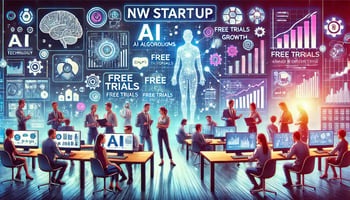Artificial Intelligence (AI) has the potential to greatly transform various industries, including...
Revolutionizing Education: The Rise of AI-Driven E-Learning
 Revolutionizing Education: The Rise of AI-Driven E-Learning
Revolutionizing Education: The Rise of AI-Driven E-Learning
The advent of artificial intelligence (AI) has transformed various industries, and education is no exception. E-learning, already a growing field, has been further revolutionized by AI technologies, offering unprecedented opportunities for personalized, efficient, and accessible education. AI-driven e-learning represents the future of education, bridging gaps, fostering inclusivity, and enhancing the learning experience.
Personalized Learning Experiences
One of the most significant advantages of AI-driven e-learning is its ability to provide personalized learning experiences. Traditional education often follows a one-size-fits-all model, which can leave some students behind while others become disengaged due to a lack of challenge. AI addresses this by analyzing individual student's learning patterns, strengths, and weaknesses. With this data, AI systems can tailor educational content, recommend resources, and adjust the pace of learning to suit each student’s needs.
For instance, AI-driven platforms like Coursera and Khan Academy use algorithms to suggest courses and materials based on a learner's past performance and interests. This personalized approach ensures that students are always engaged with content that is relevant and appropriately challenging, fostering a more effective and enjoyable learning experience.
Intelligent Tutoring Systems
Intelligent Tutoring Systems (ITS) are another breakthrough in AI-driven e-learning. These systems provide real-time feedback and support to students, simulating the experience of having a personal tutor. Through natural language processing and machine learning, ITS can understand student queries, provide explanations, and offer hints, effectively guiding students through their learning journey.
A notable example is Carnegie Learning’s MATHia, an AI-driven math tutoring system that adapts to each student’s learning style and progress. It provides personalized feedback and adjusts problems to match the learner’s current level of understanding, thereby helping students master complex concepts more efficiently.
Enhancing Teacher Capabilities
AI-driven e-learning doesn’t just benefit students; it also enhances teacher capabilities. By automating administrative tasks such as grading and attendance tracking, AI allows educators to focus more on teaching and engaging with students. AI can analyze student data to identify those who may need additional support, enabling teachers to intervene early and provide targeted assistance.
Moreover, AI-powered analytics tools can provide teachers with insights into the effectiveness of their teaching methods and materials. This data-driven approach helps educators refine their strategies, ensuring that they are using the most effective techniques to enhance student learning outcomes.
Breaking Down Barriers
AI-driven e-learning is instrumental in breaking down educational barriers, making quality education more accessible to people worldwide. Online platforms powered by AI offer courses from prestigious institutions, allowing learners from remote or underserved areas to access top-tier education without geographical constraints. Additionally, AI translation tools can break language barriers, making educational content accessible to non-native speakers.
For instance, platforms like Duolingo use AI to personalize language learning, adapting to the user’s proficiency level and learning pace. This makes language education more effective and accessible, promoting global communication and understanding.
Future Prospects
The future of AI-driven e-learning is promising, with continuous advancements in AI technologies poised to further enhance educational experiences. Virtual reality (VR) and augmented reality (AR), combined with AI, are expected to create immersive learning environments that can simulate real-world scenarios, providing practical experience in a controlled setting.
Moreover, AI’s role in lifelong learning cannot be overlooked. As the job market evolves, continuous learning becomes essential. AI-driven e-learning platforms can help individuals upskill and reskill, ensuring they remain competitive in a rapidly changing world.
Conclusion
AI-driven e-learning represents a paradigm shift in education, offering personalized, efficient, and accessible learning opportunities. By harnessing the power of AI, we can create educational systems that cater to individual needs, enhance teaching effectiveness, and break down traditional barriers to education. As AI technology continues to advance, the potential for e-learning to transform education and empower learners globally is boundless. The future of education is here, and it is driven by artificial intelligence.



